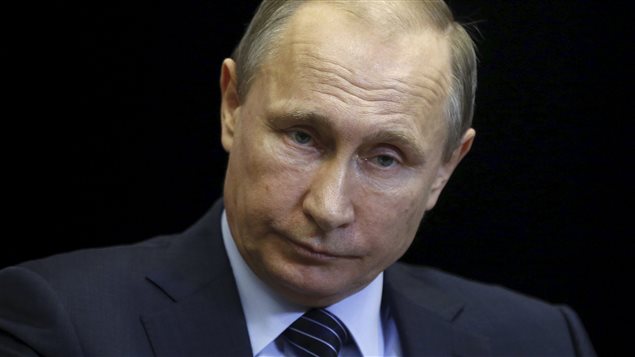
The downing of the Russian Su-24 fighter bomber by a Turkish F-16 fighter jet has been described as the most serious armed incident between Russia and a NATO country in the last 50 years.
It has strained relations between Russia and Turkey – who until recently enjoyed very warm and mutually profitable relations – to an almost breaking point. Russian President Vladimir Putin has called the Turkish action “a stab in the back” and has vowed to retaliate. Russia has already severed all military ties with Turkey and drawn up an extensive list of economic sanctions.
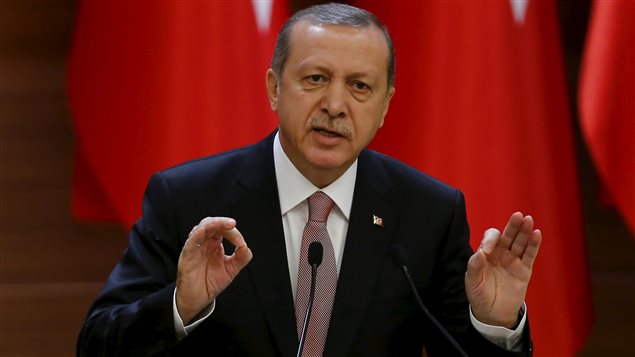
Turkish President Recep Tayyip Erdogan is refusing to apologise for the downing of the Russian fighter bomber and is calling on Russia “not to play with fire.”
By extension, tensions between Russia and other NATO countries, including Canada, have hit a new high.
To make sense of this very complicated situation I talked to three experts: Paul Heinbecker, is Canada’s former ambassador to the United Nations; Ferry de Kerckhove is also a former high-ranking Canadian diplomat with significant experience in Russia and the Middle East; and Kyle Matthews is the Senior Deputy Director of the Montreal Institute for Genocide and Human Rights Studies at Concordia University and a Fellow at the Canadian Defence and Foreign Affairs Institute.
All three agree that the situation is potentially very dangerous but hope that cooler heads will prevail. The two countries have much to lose if relations between them spiral out of control.
But Heinbecker, de Kerckhove and Matthews differ in their analysis of some of the root causes for the heightened tensions.
(click here to listen to the interview with Paul Heinbecker)
Listen(click here to listen to the interview with Ferry de Kerckhove)
Listen(click here to listen to the interview with Kyle Matthews)
My take
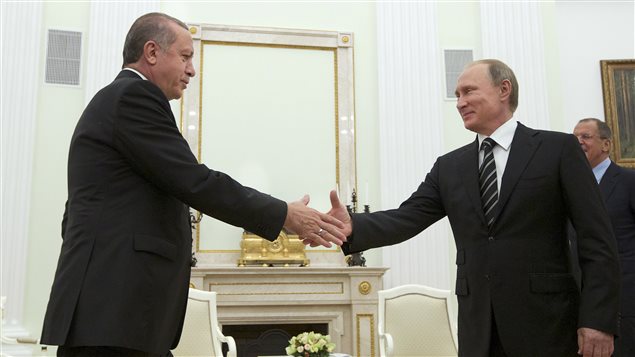
What worries me the most about this latest round of tensions between Russia and Turkey is not so much that a NATO country shot down a Russian plane – a very troubling development in itself, especially since it resulted in the death of two Russian servicemen – but that the two sides seem to be genuinely surprised by each other’s actions.
Unless Vladimir Putin sometime in his KGB past has also mastered Stanislavski’s acting method, he seems to be putting on a very convincing show of bewilderment, even a sense of betrayal. He has called Turkey’s action a “stab in the back.”
So, why is President Putin so surprised that the Turks shot down his plane?
Is it because, as some would say, like a school bully Putin simply didn’t expect to get punched back in the nose? Or did he and his advisors simply not realize how politically sensitive the issue of occasional Russian incursions into Turkish airspace and their bombing raids of Turkmen villages along the Turkish-Syrian had become for Ankara?
Did Putin simply think that Erdogan will never dare to jeopardise Turkey’s very significant trade relationship with Russia? After all, Russia is Turkey’s biggest supplier of natural gas, wheat, and at least two million sunthirsty Russian tourists flock to Turkey’s Mediterranean coast every year.
And why does Turkish President Recep Tayyip Erdogan seem to be so surprised about how forcefully the Russians are responding to their plane being shot down from the skies and to losing two servicemen, and how willing they seem to be to cut very profitable trade ties with Turkey?
It seems, despite their long relationship, both leaders have shown a remarkable lack of understanding of each other’s motivations and perceptions of the geopolitical reality.
Stopping the domino effect
Turkey, and the West in general, seem to have written off Putin’s dramatic entry into the Syrian conflict as a mere posturing by a wannabe superpower, hellbent on propping up Russia’s only client regime in the Middle East.
What many in the West fail to see is that the Russian perception and their analysis of the root causes of the conflict are very different from western perceptions.
The Kremlin’s reasons for intervening in the Syrian conflict are much more complex than just a desire to prop up a client dictator. Putin perceives the situation in Syria as a direct threat to his own security and to Russia’s national security.
In Putin’s view Syria is just the latest in a string of Western-instigated “colour revolutions” – Serbia, Ukraine twice, Georgia, Moldova, Libya – that have not only sought to contain Russian influence in the world, but have undermined the foundations of the post-WWII international regime. Whether they are right or not, Putin and his advisors fear that Russia is the next chip to fall in this domino effect.
Russia is also worried about a hostile radical Islamic regime taking hold so close to its still-soft southern underbelly in the Caucasus. The Syrian city of Raqqah, the capital of the so called Caliphate, is only a 20 hours drive from Chechnya’s capital Grozny. And thousands of Russian jihadis have joined the ranks of ISIS/ISIL and the various rebel groups. The return of these battle-hardened radicals to Russia could set off another war in the Caucasus.
Then there is the matter of the Russian naval base in Tartus, Russia’s only remaining naval base outside its borders (the U.S. for example has naval bases in 18 countries).
The Sevres syndrome
Turkey’s intervention in Syria is also motivated by existential angst and fear of instability along its long and porous southern border, and old imperial instincts.
“The Turks are extremely sensitive when it comes to their territory,” said Ferry de Kerckhove, a former high-ranking Canadian diplomat and a Fellow of the Canadian Defence and Foreign Affairs Institute. “They have a difficult hand to play because of their relationship with the Kurds, they are very worried that a Kurdistan might emerge from the leftovers of the battle against ISIS.”
Ever since its inception from the ashes of the Ottoman Empire, the modern Turkish Republic (just like modern Russia) has feared further dismemberment. The Treaty of Sevres signed by the victorious Allies in 1920 was supposed to divide Turkey into Armenian, British, Italian, French, and Greek zones (with an eventual Kurdish entity to be created in the British and French zones).
Mustafa Kemal’s rallying of Turkish nationalist forces and his victory over the Greeks in the west and the Armenians in the east, meant that the Treaty of Sevres was never implemented and Turkey’s borders were eventually settled in the shape we know today.
But it seems this fear of dismemberment has never left the Turkish establishment and has been a driving force behind much of Turkey’s internal and external policies. It was this fear that drove Turkey to abandon its policy of neutrality and become a founding member of NATO.
And it is this fear that has shaped Turkey’s policy towards its Kurdish minority. With Armenians and Greeks virtually annihilated and expelled, the Kurds remained the only indigenous minority posing a threat to Turkey’s territorial integrity. Turkey’s decades-long policy of trying to assimilate its Kurdish population by denying it even the most basic cultural rights has been an abject failure.
In fact it’s probably responsible for driving a significant portion of the Kurdish population to support a left-wing Kurdish nationalist party, the Kurdistan Workers’ Party (PKK). Since the mid-1980s, the PKK has led an on-and-off bloody insurgency to achieve autonomy and/or eventual independence in southeast Turkey, along the border with Iraq and Syria, which have their own Kurdish minorities.
Turkey sees the emergence of a Kurdish state in either Iraq or Syria as a huge threat to its sovereignty. And while for various internal and external reasons Ankara has been able to establish some sort of a modus vivendi with the Iraqi Kurdish leadership, the Syrian Kurds, who are closely allied with the PKK, have been a thorn in their side.
Some say, this has driven Turkey into an unholy alliance with various groups in Syria and Iraq, including ISIS, which has been battling the Kurds for control of Syria’s border with Turkey.
Perfect storm of colliding interests
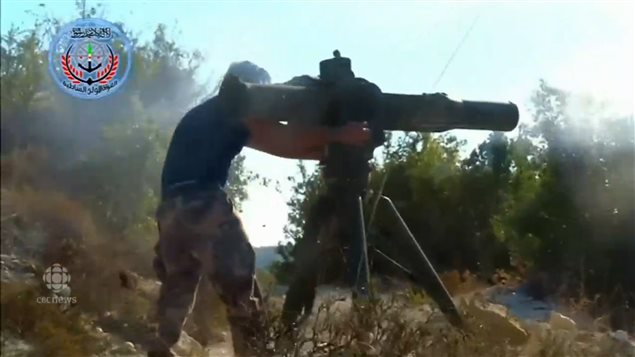
One of the rebel groups that Turkey has been arming, training and supporting from the very onset of the civil war in Syria is a loose alliance of Turkmen militia.
The Turkmen are a Turkish-speaking minority on the Syrian side of the border. The estimates of the number of Turkmen in Syria (there is also significant Turkmen presence in northern Iraq) range anywhere from 200,000 to 3 million people.
The Turkmen rebels control a strategic area along the jagged border with Turkey and their ranks have reportedly been filled with dozens of Turkish volunteers. And while some Turkmen forces have clashed with ISIS, which is reported to have carried a number of massacres in Turkmen villages in northern Syria, most of their fighting has been against Syrian government forces.
Russia also accuses them of hosting hundreds of Russian jihadis from the Caucasus. Russian media say the forest covered mountains of northwestern Syria, are very similar to the terrain in the Caucasus and are ideal for Russian jihadis.
So when the Russian jets started going after the Turkmen rebels, they weren’t just bombing any rebel group, they were blowing up Turkey’s proxy army and perhaps, Turkish citizens. In the process, it’s also very likely they violated Turkish airspace.
Russian Kremlin-controlled media has made much of the fact that several cameras were present on both sides of the border to witness the shooting down of the Russian fighter bomber, attributing this to a planned provocation. The Youtube footage of Turkmen fighters then shooting dead one of the Russian pilots as he parachuted from the stricken jet and then blowing up a search and rescue helicopter killing a Russian marine have incensed the Russian public opinion.
Gaging retaliation
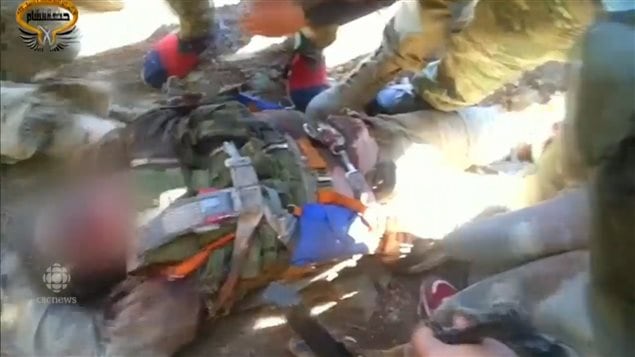
Some sort of retaliation by the Russians seemed inevitable.
For now, Russia is limiting itself to economic sanctions against Turkey: a military confrontation with a NATO country is not in its interests.
“The last thing Putin wants is to have a war with NATO,” de Kerckhove said.
And while NATO countries have publicly expressed their support for Turkey’s right to defend its sovereignty, in private they are urging Turkey to keep its cool.
The problem is while Erdogan and Putin have publically drawn up their red lines, the strategic realities that led them to cross them in the first place remain unchanged.
Then there is the problem of the personalities of both leaders, said Kyle Matthews, the Senior Deputy Director of the Montreal Institute for Genocide and Human Rights Studies at Concordia University and a Fellow at the Canadian Defence and Foreign Affairs Institute.
“Both Turkey and Russia are led by what people would say are autocratic leaders who hold absolute power and are ruthless in using the political power, and the power of their countries to achieve certain aims,” Matthews said.
Paul Heinbecker, Canada’s former ambassador to the United Nations and a former Canadian diplomat with extensive experience in Turkey, says a lot depends on how far the Russians want to push it and how vigorously the Turks might want to respond.
“I guess they have misjudged their adversary, and that’s one of the problems when you have heavily armed states operating in the same territory, miscalculation can lead to pretty serious problems,” Heinbecker said.
Matthews said Russia has already retaliated with force by targeting what it claimed was a convoy of oil tanker trucks bringing oil from ISIS controlled areas for sale in Turkey.
“I think there are fundamental differences between what Western countries want, what Turkey wants and what Russia wants,” Matthews said. “And it’s particularly Turkey’s support for groups like ISIS – providing arms to them, providing them safe cover, allowing them to actually come into Turkey and receive healthcare – that has been very troubling, and I think a lot of countries, including Canada should be wondering what is Turkey doing.”
Turkey’s gradual drift towards a more Islamist country under Erdogan, some analysts now openly wonder whether Western interests in Syria are more aligned with Russian interests than Turkish interests, Matthews said.
Things eventually will settle down faster than the row between Turkey and Israel after Israeli special forces boarded a Turkish flotilla trying to break the Gaza blockade, de Kerckhove predicted.
“I think there too many interests at stake there, but it does throw another wrench into an impossible situation in that region,” de Kerckhove said.
He said efforts by France to cobble some kind of a coalition between Russia and the West to fight ISIS will continue, and the countries have already agreed on intelligence sharing and other forms of military cooperation but a major stumbling block remains the future of Assad.
“It’s very important for Russia that somebody in power remained in Syria so that it doesn’t fall down into a multi-ethnic conflict that is at the border of the Russian empire the way Libya fell down,” de Kerckhove said. “I think Putin annoys us but very often we forget to consider that he has much greater interest in that region than we have.”
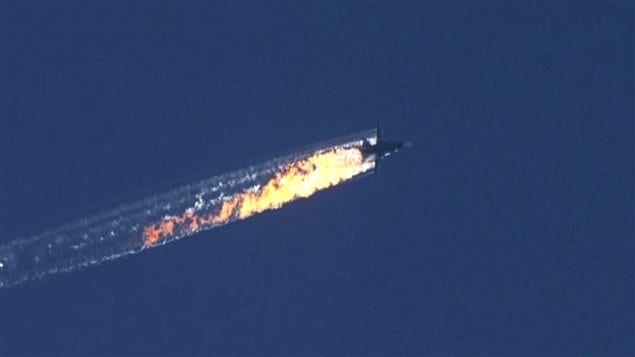







For reasons beyond our control, and for an undetermined period of time, our comment section is now closed. However, our social networks remain open to your contributions.